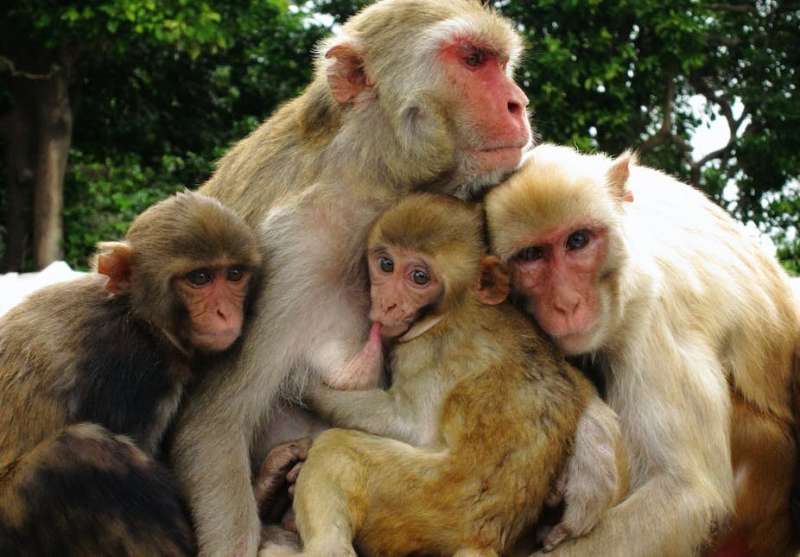This article has been reviewed according to Science X's editorial process and policies. Editors have highlighted the following attributes while ensuring the content's credibility:
fact-checked
trusted source
written by researcher(s)
proofread
Macaque monkeys shrink their social networks as they age—research suggests evolutionary pattern seen in elderly people

There are many changes that can come with old age—hair turns gray, eyesight isn't quite what it used to be, mobility often becomes limited. But beyond these physiological changes, people also experience changes to their social world. As we age, our social circles tend to get smaller.
Such declines in social networks have raised concern among scientists who are aware of just how important social relationships are to health and well-being. Being socially isolated can harm health as much as obesity, alcoholism or sedentary living.
In the past decade, however, scientists have started to think that the shrinking of social networks with age might not be all bad.
Rather than social declines being driven exclusively by the death of friends or deteriorating health, people might become more selective in their social interactions as they age. After all, many older adults tend to focus their social effort on family and close friends. This change in social focus might result from older adults' being aware of the limited time they have left and prioritizing their most important relationships.
As a behavioral ecologist and a molecular ecologist, we were interested in understanding the evolutionary roots of these age-based changes in social focus.
To investigate whether other animals share these patterns of social selectivity with age, we turned to a free-roaming population of over 200 macaques on the island of Cayo Santiago in Puerto Rico. In collaboration with our colleagues, we collected eight years of data about how these monkeys interacted with one another as they got older.
We found striking parallels to the patterns of social aging seen in humans, and our study sheds light on the causes and potential consequences of shrinking social networks with age.
Picky partner choice
We focused specifically on female macaques, because they have the most stable long-term relationships in this population. With the help of several dedicated research technicians, we followed these females for up to seven hours a day over the course of eight years.
First, we found that female macaques did indeed spend time with fewer social partners as they got older. Aging macaques sat near fewer partners and also groomed fewer partners. Grooming is an important bonding behavior in macaques that females do only with their besties.
Importantly, this reduction in females' social circles was not precipitated by their partners dying or by older monkeys being seen as somehow undesirable and therefore to be avoided. We observed that how often other monkeys sought out older females as social partners did not change with age.
Instead, there seemed to be clear evidence that females were actively reducing the size of their social networks over time. Specifically, as females got older, they initiated interactions with fewer group mates. We observed these declines beginning in females who were in their prime years (around 10 years old) all the way through those who were near the end of their lives (around 28 years old).
A family matter
Of course, an important piece of this puzzle is who these female macaques did choose to interact with as they got older.
We found that, similar to humans, aging female macaques focused their time and effort on family members and "friends" with whom they shared a particularly strong and stable bond.
While this narrowing of networks and focus on kith and kin does not necessarily result from macaques' being aware they are nearing death—scientists aren't sure if nonhuman animals have an awareness of their own mortality—it does suggest that there may be a shared evolutionary reason for social selectivity in humans and other primates.
Why might this be?
One possibility stems from the fact that as humans and other mammals get older they experience declines in their immune system. We get sick more easily and have a harder time recovering when we do come down with something.
Reducing one's social circle with age may be an important way to avoid acquiring a disease or other illness. Such a decrease need not be a deliberate strategy, but could be an unconscious tendency that was selected for over evolutionary time because it enhanced biological fitness in our primate ancestors. As a result, this pattern might persist today, even in humans well beyond their reproductive years.
A hopeful outlook
So, what does this all mean? Understanding how people can live longer and healthier lives is a central priority for health organizations worldwide. Figuring out how to maintain valuable social relationships into old age is likely to play a key role in that endeavor.
The results from this study indicate that the shrinking of networks across the life span is an aging pattern that is not unique to humans but may be present in other primates.
While loneliness in the elderly is a health concern that should not be ignored, there may be important distinctions between those who are unwillingly isolated as they get older and those who choose to stick to a smaller social circle. In the latter cases, shrinking networks with age may not be all bad.
Instead, there may be important benefits to be gained from being selective in our socializing as we get older, which has allowed this pattern to persist for millennia.
Provided by The Conversation
This article is republished from The Conversation under a Creative Commons license. Read the original article.![]()





















